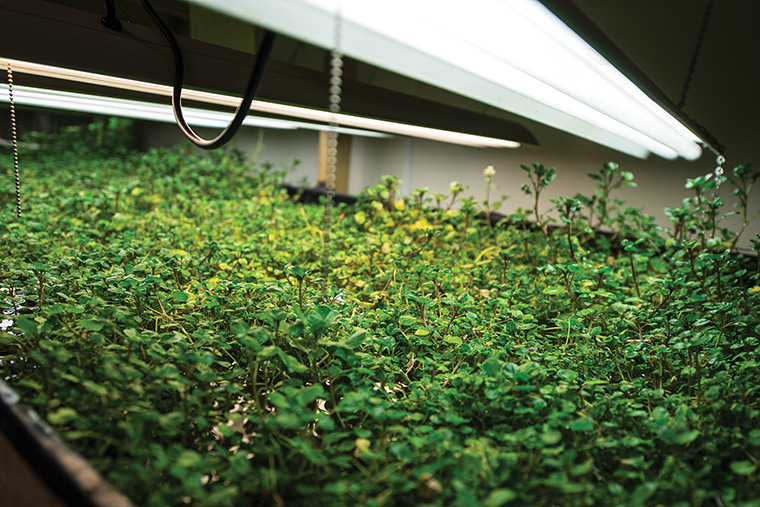Green oasis sprouts in gray town
March 17, 2014
Inside the shell of a former meat-packing facility, the gurgle of rushing water, rich scent of tilled earth and bright green glow of new seedlings fill a small room. The plants, tended by South Side native Nick Greens, are in neat rows of plastic trays placed on industrial racks against sunlit windows. Outside, the dilapidated urban sprawl of the Back of the Yards neighborhood extends to the horizon.
The Plant, 1400 W. 46th St., which has been operating since 2010, is not just home to Greens. It hosts multiple tenants, including Pleasant House Bakery; Greens & Gills LLC; Arize Kombucha, a fermented tea brewery; and nonprofit organization Plant Chicago. The Plant is an oasis of opportunity in the low-income neighborhood that provides the community members with a place to learn marketable skills, said Greens.
Greens said there are more businesses to come and that The Plant will create 125 jobs within the year in community district 61, where Back of the Yards is located. Back of the Yards has a 13 percent unemployment rate, according to the 2008-2012 American Community Survey.
There are also plans to lease to a microbrewery and organic cheese maker in the coming months, Greens said.
Bubbly Dynamics LLC Founder and Executive Director John Edel purchased the building in 2010 to bring business back to an area that was once the center of the United States’ meatpacking industry. The Plant features weekly guided tours and hosts a farmer’s market in the summer.
Greens grows microgreens and specializes in the garnishes that top the most expensive plates at Chicago’s many high-end restaurants, including the Michelin-starred downtown Everest, 440 S. LaSalle St.
Greens, who used to work for Plant Chicago, left the nonprofit and began his own garnish-growing ventures on March 1. Greens is still passionate about educating the community, but he said he thinks bringing in capital will do more to benefit the area.
“I had a decision to make,” Greens said. “Either I stay with the nonprofit and stick with education or break away and start off with just business—which is a better thing for me to do because I can bring more money in here to give to education.”
The Plant’s model is built on business incubating, which provides a space for small businesses with little startup capital.
Sophomore journalism major Emile Perez began working with Greens after they met while volunteering at a local food shelter. Perez, a Back of the Yards resident, said he thinks Greens’ company and similar companies are bringing the community something it never had.
“Giving back to the neighborhood, that’s what [Greens’] microgreens initiative is all about,” Perez said.
Greens is committed to promoting healthy living and eating Perez said. He added localized training could introduce sustainablity as a community standard.
Plant Chicago uses aquaponics, a system of aquaculture where the waste produced by farmed fish is used to supply nutrients to hydroponically grown plants to grow a large portion of its product. Using nitrate-rich fish waste as plant fertilizer creates a simple but dynamic sustainable, eco-friendly system. The Plant has a total of four aquaponic growers.
“Instead of adding chemicals to the water, like you do with hydroponics, you’re just using the waste from the fish [to] provide plants with their nutrients,” said Eric Weber, Plant Chicago’s aquaponics coordinator.
Weber said the aquaponics facility is a large draw for tourists and anyone who wants to learn the trade.
“We are starting to do more aquaponics-related workshops,” Weber said. “There’s such an interest in growing plants in your basement or in your garage.”
Despite its success, The Plant’s slow growth and business incubation model attracts idealists who may not realize the challenges they face, said Jeff Spitz, associate professor in the Cinema Art + Science Department.
Spitz is an Emmy award-winning documentarian who has made numerous films about urban sustainability, including “Food Patriots,” which premiered Feb. 19. He said he thinks that progress at The
Plant will be slow because it relies primarily on volunteer work, which is not a dependable resource.
“The idea of The Plant makes a lot of sense, but [takes] a lot of sweat equity,” Spitz said. “There aren’t a lot of people who are going to roll up their sleeves and work from the ground up when they could be working for a company and getting a paycheck.”








